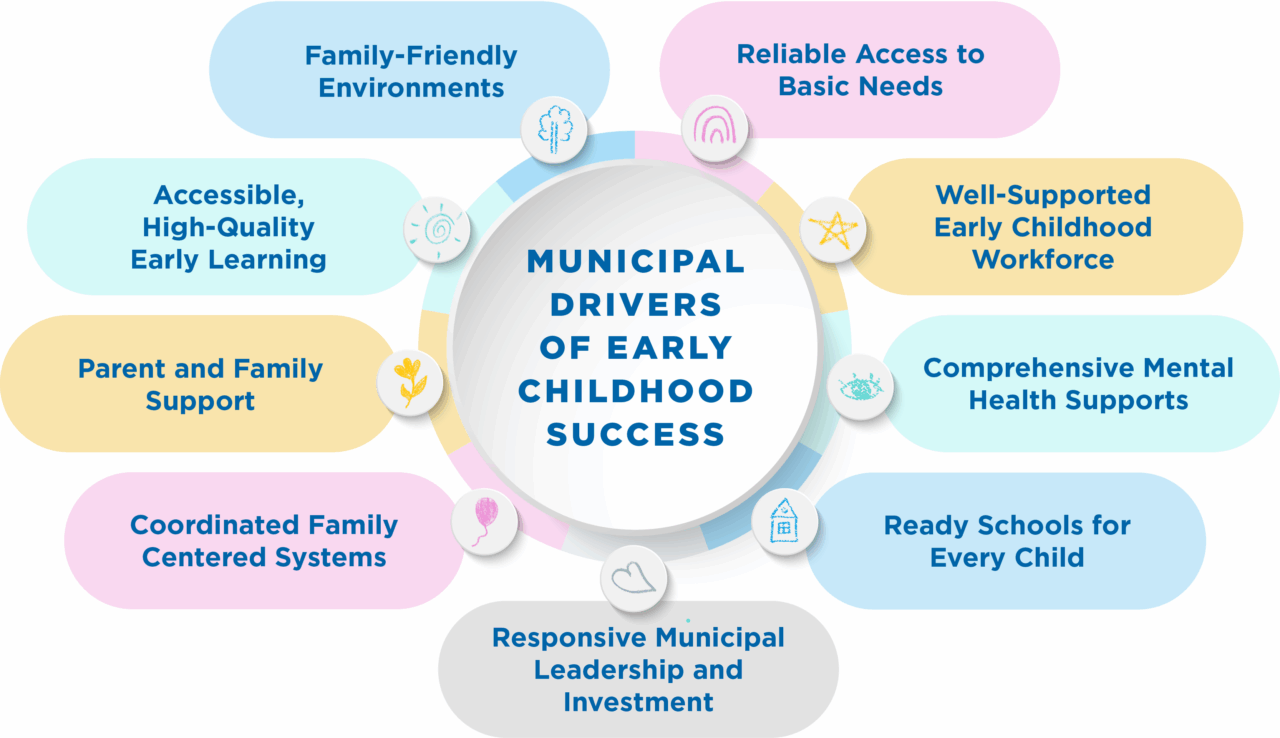
Download the full image for detailed descriptions of each municipal driver of early childhood success.
Why Start Early?
Neuroscience shows that the most rapid period of brain development occurs in the early years, particularly from the prenatal stage to age three, laying the foundation for all future learning, behavior and health. Investing in this critical period is not just the right thing to do, it’s also the smart thing to do. High-quality early childhood systems promote school readiness, workforce participation, public safety and long-term economic growth, while reducing the need for more expensive interventions later in life.
To be truly effective, early childhood efforts must take a whole child, whole family approach. Supporting young children means supporting their families through integrated services that address health, education and economic security. Municipal leaders have a powerful opportunity to shape the future by building systems that meet the interconnected needs of young children and the people who care for them.

Who Is This Road Map For?
Local governments play a key role in ensuring all young children have the resources and opportunities to reach their full potential and that their families live healthy and prosperous lives. There are a number of actions municipal leaders can take to promote early childhood success. This roadmap is for elected and senior municipal officials who want to make their community a better place for children and families to thrive.
- Mayors, as agenda setters, can prioritize early childhood success in city budgets and policies ensuring resources are allocated effectively. Additionally, they can leverage their “bully pulpit” to raise awareness and champion the needs of young children, families and the early childhood workforce to make sure their voices are represented in city decision-making.
- City Councilmembers can make early childhood success a priority in their agendas, leading to increased funding and support for local programs. They can also advocate for state-level policies that benefit young children (PN8), families and the early childhood workforce.
- City Managers are often responsible for implementing the policies and programs established by City Council and the Mayor. City managers oversee the allocation of resources (funding, staffing, etc.) and infrastructure to support early childhood initiatives. City managers are also well positioned to facilitate collaboration across city departments and external agencies to coordinate child and family services and partnerships.
- Department Leaders can break down silos, align goals and programming across sectors, and build a strong, responsive system supportive of young children and their families and the early childhood workforce. They can prevent duplication of services, avoid wasteful spending, address gaps in services, and unify policies and practices to improve the quality and well-being of communities.

Key Terms to Know
- Whole Child, Whole Family Approach – A holistic, collaborative way of addressing the needs of children and their families, recognizing that their well-being is interconnected.
- Prenatal-to-Eight (PN8) – The period from prenatal development to eight years of age. This timeframe window is widely considered to be the most critical for a child’s health, development and learning.
- Young Children – In this document, “young chidren” refers to the population from the prenatal stage through age eight, encompassing infants, toddlers, preschoolers, and early elementary-age children
Types of Early Care and Education Programs Along the PN8 Spectrum:
- Home Visiting Programs – Provide parenting support, health education, and developmental screenings.
- E.g. Maternal, Infant, and Early Childhood Home Visiting (MIECHV) Program which helps pregnant women and parents of young children improve health and well-being for themselves and their families.
- Early Head Start – A federal program offering early learning, health, and family support services to low-income pregnant women and children under age 3.
- Head Start – A federal program that promotes school readiness for children ages 3 to 5 from low-income families by providing early learning, health, and family support services
- Child Care Centers – Licensed, non-residential centers offering structured, age-grouped care with multiple staff in a commercial setting
- Family Child Care Homes – Small, home-based program where typically one or two caregivers provide care for small groups of mixed-age children, often with flexible, non-traditional hours.
- Family, Friend, and Neighbor Care – Care provided in the child or caregiver’s home by a person who is a relative, friend, neighbor, or nanny.
- Preschool Programs – Early learning programs for ages 3–5 that promote school readiness through play and structured activities.
- School-Age Programs – School-age programs typically provide care for children when they are not in school, including during the before and after school hours, school holidays, and summer break.
